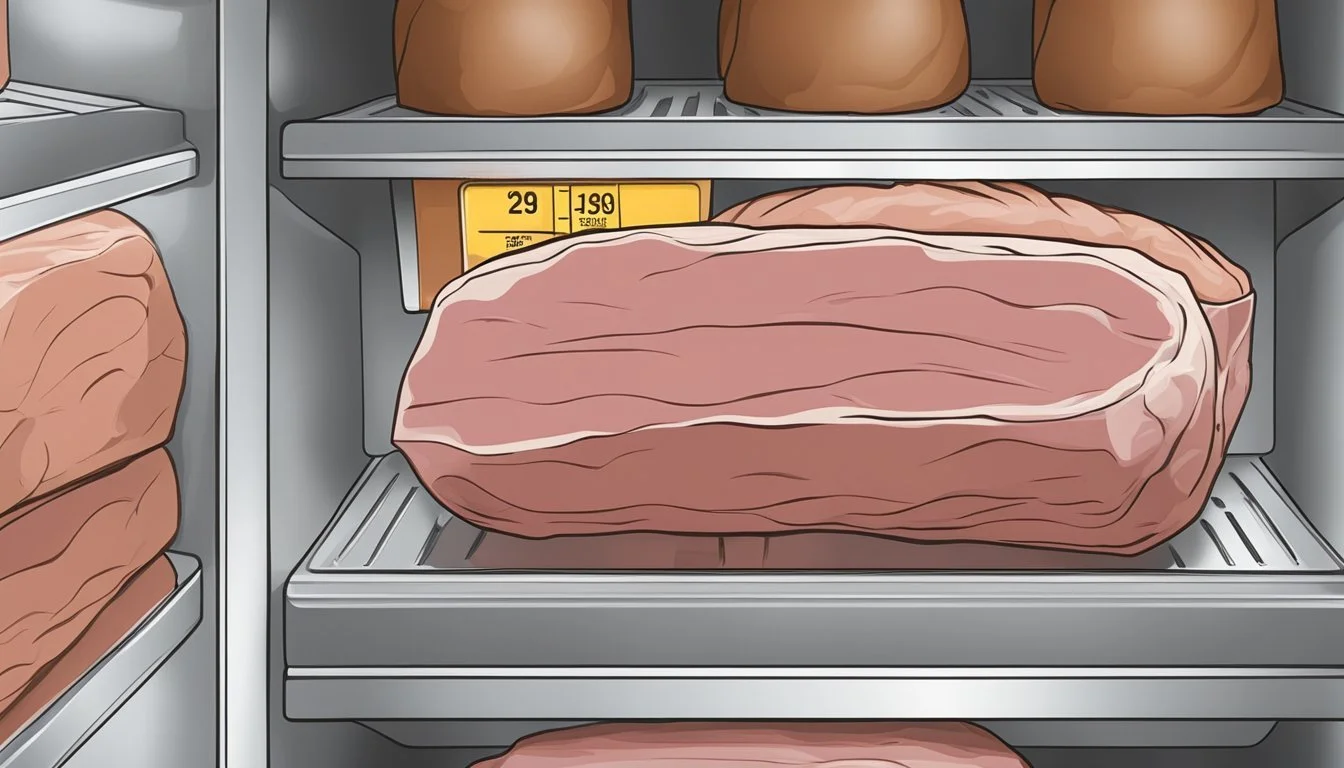How Long Does Roast Beef Deli Meat Last?
Shelf Life Explored
Roast beef deli meat is a popular choice for sandwiches and quick meals, prized for its flavor and convenience. When stored in the refrigerator at or below 40°F, roast beef deli meat will generally remain safe to consume for 3 to 5 days. The key to maintaining its freshness and safety is proper storage in an airtight container or tightly wrapped in plastic.
Consumers should be aware that the shelf life of roast beef deli meat can vary based on factors such as packaging and handling. Once the original packaging is opened, or the meat is sliced at the deli counter, exposure to air and bacteria can begin to affect its quality and longevity. Observing the meat for any signs of spoilage, such as discoloration, off-putting odors, or a slimy texture, is crucial. If any of these signs are present, the meat should not be consumed.
For those who need to keep roast beef deli meat beyond the recommended fridge storage duration, freezing is an option. In the freezer, roast beef deli meat can be kept for 2 to 6 months when properly stored. However, for optimal taste and quality, it's best to consume the meat within the shorter end of the recommended storage timeframe. After thawing, the same refrigeration guidelines apply, and the meat should be eaten within 3 to 5 days.
Understanding Roast Beef Deli Meat
Roast beef deli meat offers a convenient protein source for quick meals and is available in various types, each with distinct nutritional profiles. This section delves into the variations and nutritional facts of roast beef deli meats.
Types of Roast Beef Deli Meat
Roast beef is a classic deli favorite, often found sliced at the deli counter or pre-packaged in the refrigerated section. Deli meats can be categorized based on their preparation and flavoring:
Traditional Roast Beef: Slow-roasted, usually seasoned with simple flavors like salt, pepper, and perhaps herbs.
Cured Roast Beef: Treated with a curing solution containing salt, nitrates, and other flavorings, which gives it a longer shelf life.
Rare Roast Beef: Cooked to a lower internal temperature, offering a pinker center and a more robust beef flavor.
It's important for consumers to note whether the roast beef is pre-packaged or freshly sliced, as this can affect its freshness and shelf life.
Roast Beef Deli Meat Nutrition
Roast beef deli meat is known for its high protein content and range of nutritional values which can vary depending on the cut of meat and preparation process. A typical nutritional profile for a 2-ounce serving of roast beef deli meat may include:
Calories: Approximately 70-120
Protein: Roughly 10-14 grams
Fat: Generally 2-7 grams
Roast beef is also a source of essential nutrients like iron and zinc. However, consumers should be aware that cured and some pre-packaged deli meats may contain higher levels of sodium and preservatives. Reading labels can provide specific information on nutritional content and allow for informed choices.
Proper Storage Methods
Proper storage methods for roast beef deli meat are crucial for maintaining freshness and safety. Deli meats can easily spoil or become a breeding ground for bacteria if not stored correctly.
Refrigerator Storage
Container: Roast beef deli meat should be kept in the refrigerator in an airtight container or wrapped tightly in plastic wrap or aluminum foil to maximize freshness.
Duration: If the meat is unopened in its original packaging, it can last for approximately 5 to 7 days. Once opened, it's best consumed within 3 to 5 days.
Temperature: The refrigerator's temperature should be at or below 40°F to inhibit bacterial growth.
Freezer Storage
Packaging: For long-term storage, wrap the roast beef deli meat in heavy-duty aluminum foil or place it in a freezer bag before freezing. This helps to protect the flavor and texture.
Freeze Duration: Properly wrapped roast beef deli meat can be frozen for 2 to 6 months.
Thawing: Thaw frozen roast beef in the refrigerator overnight to ensure it remains at a safe temperature.
Shelf Life of Roast Beef Deli Meat
The shelf life of roast beef deli meat varies significantly based on whether the package is opened or unopened, the storage conditions, and if it is frozen. Consumers should be aware of the signs of spoilage such as odor, discoloration, and slime to ensure the meat has not gone bad.
Unopened Packages
Roast beef deli meat in unopened packages typically remains fresh for up to 5 to 7 days past the sell-by date when stored in the fridge. To maintain best quality, it's essential to refrigerate the meat promptly after purchase and keep it at a constant temperature of 40 °F (4 °C) or below to inhibit bacterial growth.
Opened Packages
Once opened, sliced roast beef deli meat should ideally be consumed within 3 to 5 days. After opening, bacteria can begin to grow more rapidly, especially if the meat is not stored correctly. It should remain refrigerated, and if any notable changes in smell, quality, or appearance are detected, such as discoloration or an off odor, the deli meat should be discarded.
Freezing and Defrosting Deli Meat
For extending the shelf life, roast beef deli meat can be frozen for 2 to 6 months. To prevent freezer burn and moisture loss, it's crucial to wrap the meat in an airtight container or heavy-duty freezer wrap. When thawed, deli meat must be consumed within 3 to 5 days, and should never be refrozen after being thawed. Always determine the quality of thawed meat by checking for any irregular smell or discoloration before consumption.
Food Safety and Spoilage Indicators
When determining the safety and freshness of roast beef deli meat, it's crucial to be aware of spoilage indicators. These signs can help consumers prevent foodborne illnesses by identifying when deli meat should be discarded.
Visual Indicators
Visual changes are often the first signs of spoilage in roast beef deli meat. Consumers should look for:
Mold: Any visible mold on the meat indicates spoilage and it should be discarded immediately.
Color: A change in color to a brownish or gray hue instead of the typical pink or red is a warning sign.
Slimy Surface: A slimy coating on the meat suggests bacterial growth and the product should not be consumed.
Olfactory Indicators
The sense of smell is a powerful tool for detecting spoilage in deli meats. Key olfactory indicators include:
Off Smell: Any unusual or sour odors coming from the meat are clear signs it has spoiled.
Rancidity: Foul or putrid smells typically indicate the presence of harmful bacteria.
Texture Indicators
The texture of the meat can also provide valuable clues about its edibility:
Sticky or Tacky Feel: If the meat feels sticky to the touch rather than smooth, this is indicative of spoilage.
Sliminess: A slimy texture is a sign that the deli meat is no longer safe to eat.
Proper handling and storing of roast beef deli meat are essential to prevent the meat from entering the "danger zone" temperatures where harmful bacteria thrive. The meat should be kept refrigerated and consumed within the safe timeframe of 3 to 5 days after opening to minimize the risk of foodborne illness.
Usage Tips for Roast Beef Deli Meat
When it comes to utilizing roast beef deli meat to its full potential, one must consider optimal storage for freshness and flavor, as well as strategic sandwich and meal preparation.
Sandwich Preparation
For sandwiches, using roast beef deli meat straight from the refrigerator helps maintain its quality and minimizes the risk of food poisoning. Bread should be fresh to complement the meat's flavor, and condiments should be applied judiciously to not overwhelm the roast beef. Cheeses like cheddar or Swiss are excellent pairings that enhance the overall taste. To assemble:
Bread: Start with two slices of your choice.
Cheese: Add a slice of cheddar or Swiss.
Roast Beef Deli Meat: Layer 3-4 slices for optimal flavor.
Condiments: Spread lightly on the top slice of bread.
Meal Planning and Preparations
Planning meals with roast beef deli meat involves short-term and potential long-term storage considerations. Consume within:
State In Refrigerator At Room Temperature Opened 3 to 5 days Discard after 2 hours Unopened Up to 2 weeks Discard after 2 hours
For meal preparations, incorporating deli meat into recipes should be done with a focus on safety and quality. Meals should be consumed promptly, and any leftovers ought to be stored correctly. Wrap it tightly in plastic or keep it in an airtight container to extend freshness. Always heat the meat until it's hot throughout before consumption to reduce bacterial risk.
Understanding Dates on Packaging
When purchasing packaged or pre-packaged roast beef deli meat, it's important to understand the meaning behind the dates found on the packaging. These dates play a crucial role in determining the freshness and safety of the meat.
Sell-By vs. Expiration Dates
Sell-By Date: This date is aimed primarily at retailers, indicating when the product should be sold or removed from the shelf. For consumers, it serves as a useful indicator of when the product is at its peak quality. One should consume pre-packaged roast beef deli meat shortly after this date to enjoy its best quality, although it may still be safe to consume if stored properly after this date.
Expiration Date: In contrast, an expiration date, which can sometimes be found on packaged lunch meats, signifies the end of the product's estimated shelf life. After this date, the safety of the meat can no longer be guaranteed. Consuming the product beyond this date is not recommended.
For roast beef deli meat, these dates ensure consumers are informed about the expected shelf life of their purchase. It's important to adhere to these indicators for both quality and safety concerns.
Responding to Foodborne Illness
Roast beef deli meat, when improperly stored or handled, can harbor bacteria that lead to foodborne illness. Recognizing the symptoms and understanding the appropriate prevention and response steps are crucial for ensuring food safety.
Identifying Foodborne Illness
The onset of foodborne illness caused by bacteria such as Listeria is characterized by symptoms including fever, muscle aches, and sometimes gastrointestinal issues like nausea or diarrhea. If one suspects that they have consumed contaminated deli meat, it is important to monitor for these symptoms. The USDA advises seeking medical attention if severe signs of foodborne illness are present, as certain groups like pregnant women, the elderly, and immunocompromised individuals are at higher risks of severe outcomes.
Prevention and Response
To prevent foodborne illness and respond effectively:
Temperature Control: Ensure that roast beef deli meat is stored at or below 40 °F to inhibit bacterial growth.
Hygiene Practices: Always wash hands before and after handling deli meats to prevent cross-contamination.
Usage Timeline: Consume or discard opened roast beef deli meat within 3-5 days to minimize the risk of illness.
Check for Spoilage: Look for changes in color, texture, or odor as signs of spoilage which can occur before the use-by date.
In the event of consuming spoiled meat, individuals should hydrate and rest, and, as recommended by the USDA, consult healthcare providers if symptoms are severe or persistent. Following these guidelines aids in maintaining food safety and mitigating the impacts of potential foodborne illness.
Advanced Tips for Roast Beef Deli Meat Preservation
Implementing proper storage techniques ensures that roast beef deli meat remains fresh and safe to consume. To maximize shelf life and flavor retention, one should consider vacuum sealing and cautious handling.
Vacuum Sealing
Vacuum sealing is a highly effective method for preserving the quality of roast beef deli meat. By using a vacuum sealer, one can remove the air from the packaging, thereby reducing oxygen levels. This reduction in oxygen slows down the growth of microbes, which are responsible for spoilage and foodborne illnesses. After vacuum sealing, placing the meat in the freezer can extend its usability for up to 2-6 months. To prevent freezer burn and drying out, it's crucial to ensure the bags used are designed for freezer storage, as this provides a robust barrier against the cold, dry air of the freezer.
Key Benefits:
Extends freshness by slowing microbial growth.
Protects against freezer burn when stored in the freezer.
Handling and Utensil Use
Proper handling and the use of clean utensils play a critical role in the longevity of roast beef deli meat. Before and after accessing the meat, one should wash their hands thoroughly to prevent introducing new bacteria to the food. Clean utensils should be used for slicing or serving to avert cross-contamination. Surfaces and storage containers where the meat will be placed must be sanitized and preferably airtight to maintain freshness and prevent the ingress of new microbes. Deli meat should not be left at room temperature for more than two hours, as temperatures between 40 °F and 140 °F can accelerate bacterial growth.
Best Practices:
Utilize clean, preferably sanitized, utensils and surfaces for handling.
Use airtight containers for storing leftovers to minimize exposure to air and contaminants.








